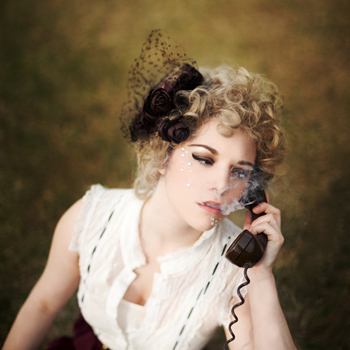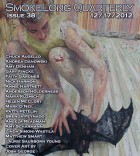You’re the author of a book of poems, Carnavoria, from H_NGM_N BKS. This is your first published fiction. (Congrats!) How was the experience of writing “Parameters” different from writing a poem? What was your plan of attack? Where did you place your attention?
In my earlier attempts at writing fiction, there was always the impulse to force the story in a certain direction and to fit the characters into particular molds. As a result, it all felt false.
When I write poetry, I feel like it’s coming from somewhere beyond my peripheral vision, and certainly not within my direct line of sight. What I find in approaching fiction writing now, after writing poetry almost exclusively for a good number of years, is that in the initial stages I can suspend that directive impulse, when it might get in the way with its over-determined pointing.
What I like about writing fiction is that I can trust the intuitive voice and also utilize the parts of my brain that want to develop characters and to figure out the logistics of an invented world. This takes time! Writing poems helped build my patience and developed my sense of detail and love of sound. What I cannot stand are “icing novels,” where just the surface is covered. Stories where the first paragraphs are back-story dumps. Good writing has layers. It’s written with both hands.
In writing fiction and poetry there is the pull of contrasting impulses. I always feel at the mercy of my poems yet compelled to over-control them. In fiction, I can be bossier, yet I am relieved to surrender to the process of creative world-building. The passage of time is something that interests me, and I examine it in my poems, but in fiction I can explore it in terms of a character’s life.
Since this is the first piece of fiction I’ve finished in a long time (As in, twenty years. Ouch.), I tried to make it easy on myself in terms of approach. It was helpful to have a word count. So instead of writing a 14-line sonnet, I wrote an under-1000-word story. For me, in moving into fiction from poetry with the intention of finishing a piece, short was a good place to start.
Writing in multiple genres helps keep my spirits up. It gives me another outlet and takes some of the pressure off one or the other.
Can you tell us the story behind the title “Parameters of a Kingdom”?
Ralph’s living in an unreachable place. He’s a character who is overly aware of himself and under-aware of the people closest to him. There are hints of missed opportunities, inertia, and the struggles of aging. There’s the presence of a rather impotent anger. He’s not “breaking”—he’s already broken. Consequently, he’s healed in some strange ways. His hallucination of the moose has become habit, long before we meet him. There’s a sense that he’s pushed everything out in order to keep control over a very few things. In the story, he’s ruling a small plot of very little.
This may be related: where did this story begin for you?
It actually started in another version, with Ralph and a floating salmon.
What I’ve found is that I have to write a lot of the bottom layers before I get to the story. The bottom layers end up in the trash bin. But once I know the boundaries—and I mean physical boundaries—where the character is going, physically, in the story—once I have that, creatively it’s like a very lush and happy terrarium: lots of moss and moisture and maybe a tiny frog. It’s similar to word count or form. Ralph is outside; Ralph goes inside; then downstairs; and back outside. In his mind, in memory, he ranges further afield, though not very far: his old office and his parents’ house.
Boundaries are also a way the writer comes to understand what a character is capable of doing. Geography and place are tied to self, and therefore to character and action and motivation. Ralph’s parameters outline a small area because his capabilities, at this point in his life, are rather reduced.
“Parameters of a Kingdom” does an excellent job of establishing mood straightaway. We get a sense of distinct unease, of a threat or darkness just barely submerged, as Ralph goes about very normal tasks—walking his dog, cropping a photo, emailing his daughter. Tell us about creating mood.
It was there from the start. Undeniably, Ralph’s a weird guy. Someone who’s a half-step off in his perceptions. Not in a dangerous sort of way—I think Ralph is fairly ineffective in the world. There is definitely a large gap between his view of reality and most other people’s—including his family. He’s suspicious in his perception of the motivations—or simply existences—of other people. I struggled at times to make him less strange, but ultimately the character is who the character is, and the writer has to respect that. Ralph just fell onto the page—or bubbled up from it—so I was compelled to follow him around and see what would happen. I think what I wanted to capture was the off-kilter nature of his thinking, because what he was doing wasn’t very interesting. If you have five characters folding laundry for an hour, at least one of them is going to be thinking something unexpected, or disturbing, or worrisome. Ralph’s the one—though I doubt he’d be folding the laundry.
You’re very attentive to sensory language—his wife smells like celery! Never seen that description before—and the rhythm of sentences in “Parameters.” What’s your strategy of building a paragraph?
The line, I think, is one of the most important elements of a poem not because a poem is built of lines, but because of how much a line can hold: tension, sound, breakages and bridges. Sentences do the same with perhaps less possible variability in their construction. From the beginning, I think the presence of the creek—the water, Ralph’s fantasy of Renee floating away—had some effect on the pattern of the sentences.
Within a paragraph, I also definitely want a bit of a pause. An interjected interruption that isn’t flowery and painterly but significant to the character’s self and the overall story. Fragments work for Ralph. His thinking only goes so far before it twists away or silences itself. Logistically, in a story this short, fragments can be vitally helpful in delivering information very quickly and in a small space.
What are you working on now?
Two short stories, another poetry manuscript, and a new series of poems that may become a free-standing chapbook. Also, a couple of personal essays, one of which incorporates my photographs.



 The core workshop of SmokeLong Fitness is all in writing, so you can take part from anywhere at anytime. We are excited about creating a supportive, consistent and structured environment for flash writers to work on their craft in a community. We are thrilled and proud to say that our workshop participants have won, placed, or been listed in every major flash competition. Community works.
The core workshop of SmokeLong Fitness is all in writing, so you can take part from anywhere at anytime. We are excited about creating a supportive, consistent and structured environment for flash writers to work on their craft in a community. We are thrilled and proud to say that our workshop participants have won, placed, or been listed in every major flash competition. Community works.